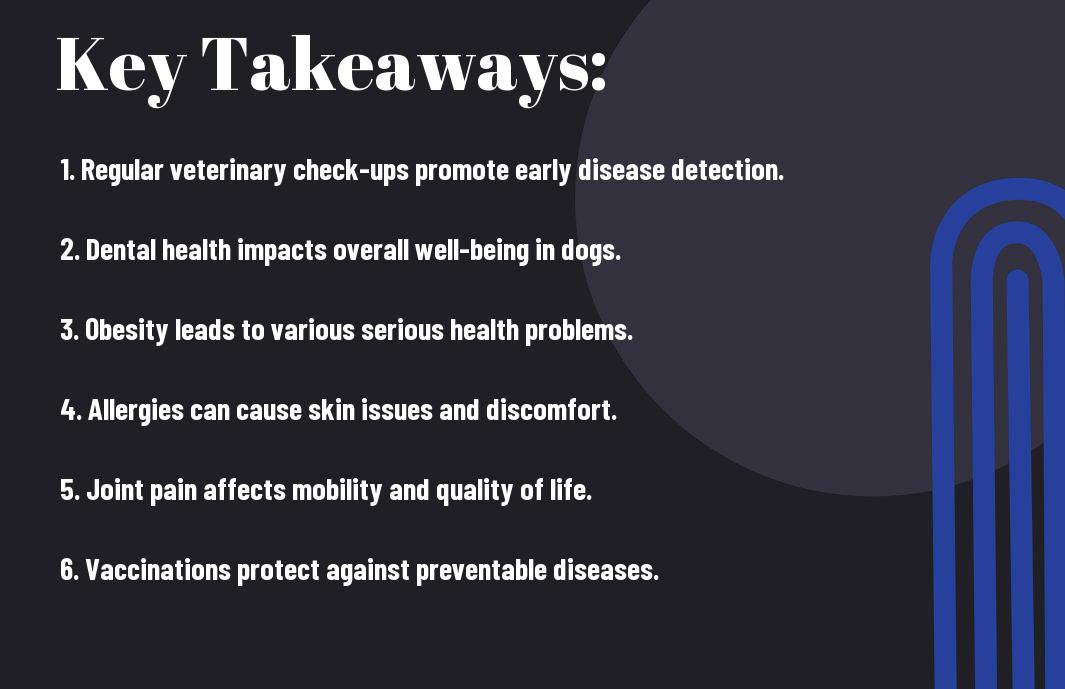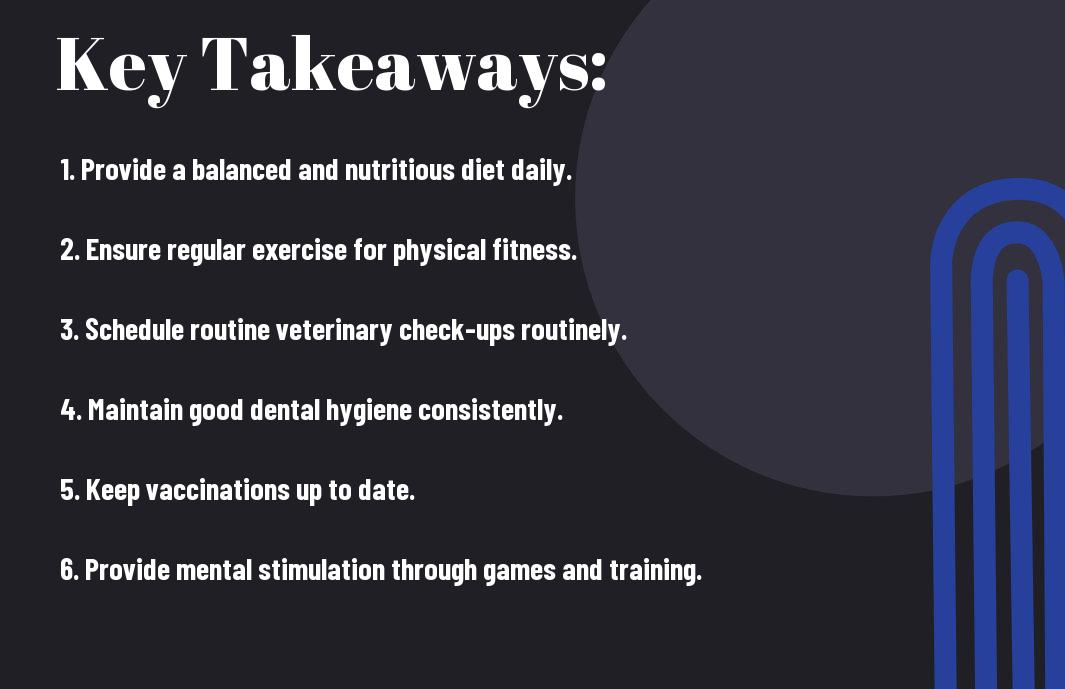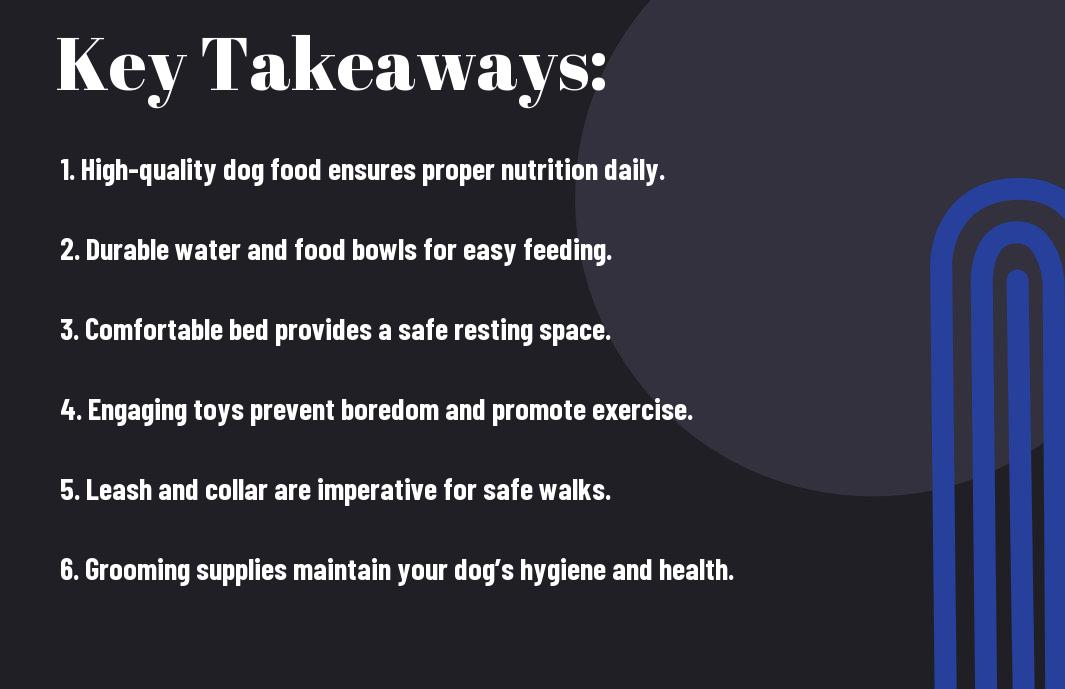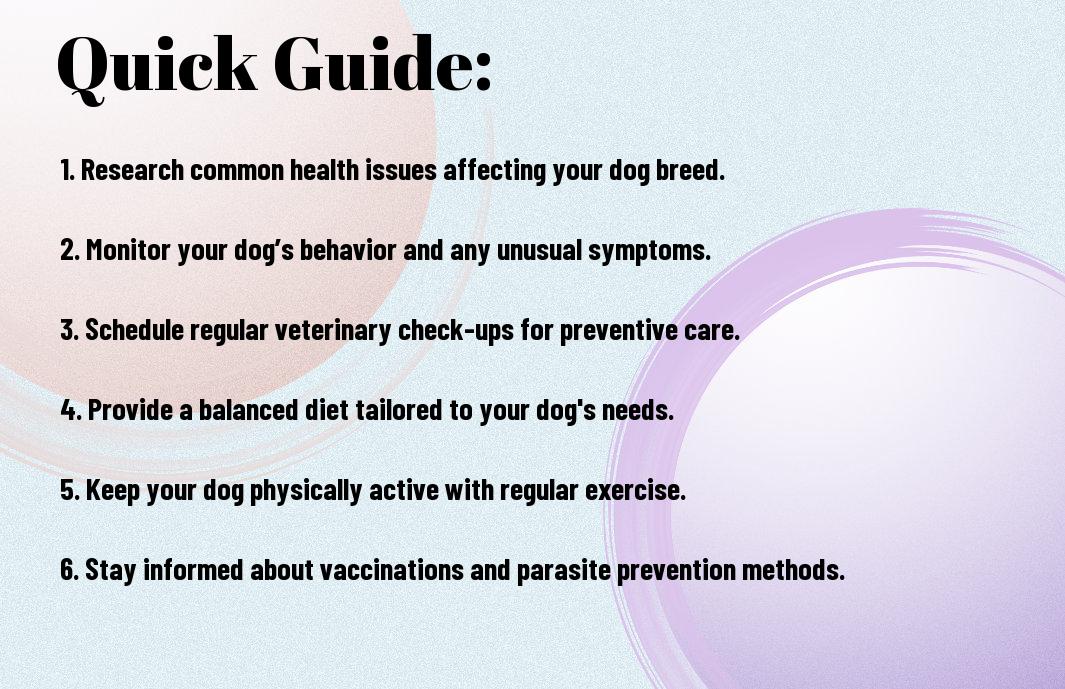There’s a wide range of common health issues that can affect your dog, and being informed is vital for maintaining their well-being. From skin problems to joint issues and beyond, understanding the symptoms and treatment options is key to ensuring your dog lives a healthy, happy life. By recognizing these issues early, you can take proactive steps to enhance your dog’s quality of life and improve their chances of a long, healthy existence. This guide will help you navigate the critical aspects of canine health that every dog owner should know.

Common Health Issues in Dogs
While your canine companion brings immense joy to your life, they may also face various health issues that require your attention. Understanding these common health problems can not only help you recognize symptoms early but also assist in seeking timely veterinary care. By being proactive, you can ensure your dog remains a happy and healthy part of your family.
Allergies
After spending time outdoors or introducing new foods to your dog’s diet, you may notice your furry friend developing symptoms of allergies. Dogs can be sensitive to a variety of allergens, including pollen, dust mites, certain foods, and even flea bites. Symptoms can manifest as itching, redness, swelling, or gastrointestinal upset. These reactions may vary from mild discomfort to severe, requiring immediate veterinary intervention.
To manage your dog’s allergies, it’s vital to work closely with your veterinarian to identify triggers and explore treatment options. This may include dietary adjustments, antihistamines, or specialized shampoos to relieve itching and inflammation. By addressing your dog’s allergies, you can significantly improve their quality of life and avoid more serious complications.
Skin Conditions
Health issues related to skin conditions are fairly common among dogs, and they can arise from a variety of sources, including parasites, infections, or allergies. Your dog may experience symptoms like redness, swelling, or hair loss. Noticing these signs early can prevent further discomfort and potential complications. Regular grooming and skin checks can help you identify any early symptoms of skin conditions.
Common skin conditions include allergies, hot spots, and fungal or bacterial infections. Dogs suffering from allergies may develop rashes or dermatitis due to environmental factors or food sensitivities. Additionally, parasitic infestations, such as fleas and ticks, can lead to severe scratching and skin irritation. Being vigilant about your dog’s skin health can help catch these problems early, allowing for prompt treatment and alleviation of discomfort.
Gastrointestinal Problems
Unlike other health issues that might be more visible or obvious, gastrointestinal problems in dogs can often be subtle yet significant. Understanding these issues is vital for any dog owner, as they can indicate underlying health conditions or dietary problems that need immediate attention.
Vomiting and Diarrhea
To address vomiting and diarrhea in your dog, it’s important to first consider the potential causes. Factors such as dietary indiscretion, infections, or even stress can lead to these gastrointestinal disturbances. If your dog vomits occasionally or has a single episode of diarrhea, it may not be a cause for alarm. However, persistent vomiting or diarrhea can result in dehydration and other serious concerns that require veterinary intervention.
To manage mild occurrences, you can start by withholding food for 12-24 hours to allow your dog’s stomach to settle. Then, reintroduce a bland diet gradually. However, if the symptoms persist for more than a day, or if you notice other signs such as lethargy or blood in the vomit or stool, seeking veterinary care is vital.
Bloat
At times, dogs can experience a condition known as bloat, which is a serious and potentially life-threatening situation. Bloat occurs when the stomach fills with gas and can twist on itself, cutting off blood supply. This condition can develop rapidly and is more common in deep-chested breeds, but any dog can be affected. Signs of bloat include a distended abdomen, restlessness, rapid breathing, and attempts to vomit without success.
Plus, understanding the signs of bloat can be a lifesaver. If you see symptoms related to bloat, it’s imperative to take quick action by contacting your veterinarian or an emergency animal clinic immediately. Note, time is of the essence here, as prompt treatment can significantly increase your dog’s chances of recovery. Recognizing bloat early means the difference between life and death, so be observant and proactive about your dog’s health and well-being.
Joint and Bone Disorders
Once again, as a pet owner, it’s crucial to be aware of the various health issues that can affect your dog, particularly those related to their joints and bones. These disorders can significantly affect your dog’s mobility, overall well-being, and quality of life if not properly addressed. Early detection and treatment can make a substantial difference in managing their discomfort and enhancing their lifespan.
Hip Dysplasia
Any dog can be affected by hip dysplasia, a genetic condition where the hip joint doesn’t fit snugly into the hip socket. This can lead to joint instability, pain, and the eventual development of arthritis. Larger breed dogs, such as German Shepherds and Golden Retrievers, are particularly susceptible to this condition. If you notice your dog exhibiting signs of difficulty getting up, reluctance to exercise, or decreased activity, it’s advisable to consult your veterinarian.
In more severe cases, untreated hip dysplasia can lead to chronic pain and lameness. As an attentive dog owner, it’s important for you to monitor your pet’s movements and seek veterinary help if you notice any changes. Fortunately, there are various treatment options available, including weight management, medications, and in some cases, surgical interventions, which may improve your dog’s quality of life dramatically.
Arthritis
Against the background of your dog’s age and activity level, it is not uncommon for them to develop arthritis, which is inflammation of the joints. This condition can cause pain, stiffness, and swelling, making everyday activities like walking or playing challenging for your dog. While arthritis is often associated with older dogs, it can also occur in younger dogs, particularly those that have suffered previous injuries or have certain genetic predispositions.
Treatment options for arthritis often focus on managing pain and improving mobility. Non-steroidal anti-inflammatory drugs (NSAIDs) are commonly prescribed to help alleviate your dog’s discomfort. Additionally, incorporating supplements such as glucosamine and chondroitin can provide some supportive benefits. Maintaining a healthy weight is also critical, as excess weight can exacerbate joint issues. Regular, moderate exercise helps strengthen muscles around the joints and can significantly enhance your dog’s mobility and quality of life.

Heart and Respiratory Issues
Despite the joys of having a dog, you may face certain health challenges, particularly regarding their heart and respiratory systems. Understanding these issues not only helps you care for your furry friend more effectively but also ensures you catch any problems early on. Heart diseases and respiratory conditions can significantly affect your dog’s quality of life, so it’s important to stay informed and vigilant.
Heartworm Disease
Around one million dogs in the United States are diagnosed with heartworm disease each year, a potentially fatal condition caused by parasites transmitted through mosquito bites. If left untreated, heartworms can lead to severe heart failure and even death. It’s crucial to keep your dog on a monthly preventative medication during peak mosquito season, especially in areas where heartworm is prevalent. Regular check-ups with your veterinarian can help catch the disease early if it does occur.
If you notice your dog exhibiting signs of lethargy, coughing, or difficulty breathing, these may be symptoms of heartworm disease. Addressing these issues promptly can make a significant difference in treatment outcomes. Your vet may recommend blood tests to confirm a diagnosis and, if necessary, follow-up on the appropriate treatment plan to protect your dog’s health.
Respiratory Infections
On the other hand, respiratory infections can also impact your dog’s health significantly. These infections can be caused by viruses, bacteria, or environmental factors and may present as coughing, sneezing, or nasal discharge. If you notice these symptoms in your dog, it’s advisable to seek veterinary care as soon as possible. Early detection can lead to better management of the condition and prevent complications.
Plus, respiratory infections can be contagious, especially in situations where dogs are in close contact, such as at dog parks or grooming salons. It’s crucial to monitor your dog’s health and be aware of any sudden changes. In many cases, your veterinarian may recommend treatments such as antibiotics or anti-inflammatory medications, alongside supportive care, to aid your dog in recovery. Keeping your dog’s environment clean and stress-free can also significantly contribute to their overall lung health.
Dental Health
To ensure your dog’s overall well-being, it is vital to pay attention to their dental health. Just like in humans, oral hygiene plays a significant role in preventing various health issues in your canine companion. Regular dental care can help you avoid conditions that may lead to discomfort and severe health complications down the line.
Dental Disease
Behind many health challenges faced by dogs, dental disease is often a leading factor, yet it frequently goes unnoticed. Bacteria build-up in the mouth can lead to plaque, tartar, and gum disease, which can result in painful infections and tooth loss. Symptoms such as bad breath, difficulty eating, or swollen gums should prompt you to consult your veterinarian for further evaluation.
Beyond the obvious discomfort, untreated dental disease can lead to systemic problems. Bacteria in the mouth can enter the bloodstream, impacting vital organs such as the heart and kidneys. It’s necessary to stay proactive by scheduling regular dental check-ups and implementing a consistent oral hygiene routine at home.
Oral Tumors
Above the common dental diseases, the presence of oral tumors can manifest as a severe concern for your dog’s health. These growths can be benign or malignant, and identifying them early can significantly affect your pet’s prognosis. Signs such as swelling, difficulty eating, or the presence of unusual lumps inside your dog’s mouth should not be ignored, as they can point to serious conditions requiring immediate veterinary care.
Prevention and early detection are paramount when it comes to oral tumors. Regular dental check-ups can aid in identifying abnormalities and facilitate prompt action. Keeping up with your dog’s dental hygiene through daily brushing and providing dental chews can contribute to overall oral health, thereby reducing the risk of both dental disease and tumors. Always consult with your veterinarian to create a dental care plan tailored to your dog’s specific needs.

Aging and Preventative Care
Your dog’s aging process brings various challenges and health concerns that require your attention and care. As dogs age, they may experience a decline in their mobility, energy levels, and overall health. It’s important to be familiar with common senior dog health issues so you can recognize and address them promptly.
Common Senior Dog Health Issues
Any dog over the age of seven is considered a senior, and with this stage of life can come a range of health problems. Arthritis is one of the most prevalent conditions among senior dogs, leading to joint pain and stiffness that can significantly affect their quality of life. Additionally, you may notice changes in your dog’s weight or appetite, which could indicate dental issues, diabetes, or thyroid problems. Cognitive decline, known as Canine Cognitive Dysfunction, can also impact older dogs, leading to behavioral changes and confusion.
Another common health issue for aging dogs is heart disease, which may manifest through symptoms like coughing or difficulty breathing. Moreover, senior dogs may be at a greater risk for developing cancers and kidney diseases, both of which require immediate veterinary attention. By being aware of these common health issues, you can better advocate for your dog’s well-being as they age.
Importance of Regular Veterinary Check-ups
An important aspect of senior dog care involves maintaining regular veterinary check-ups. As your dog ages, their health can change rapidly, making it vital for your veterinarian to monitor their condition regularly. These check-ups allow for early detection of any potential health issues, which can lead to better treatment outcomes and an improved quality of life for your furry friend.
Understanding the significance of these visits means recognizing that early intervention can often make a significant difference. The veterinary examinations will likely include a thorough physical assessment and may involve blood tests, urinalysis, and imaging to evaluate your dog’s kidney function, liver health, and overall well-being. By committing to regular check-ups, you are taking proactive steps to ensure that your senior dog receives the necessary care and that any health issues are managed swiftly and effectively.
Final Words
Presently, understanding common health issues in dogs empowers you to make informed decisions for your furry companion’s wellbeing. By recognizing the signs and symptoms associated with conditions like allergies, obesity, dental disease, and more, you can take proactive steps toward effective prevention and treatment. Ensuring regular check-ups with your veterinarian enables timely interventions, enhancing your dog’s quality of life.
Moreover, being attentive to your dog’s dietary needs and exercise routines will significantly contribute to their overall health. You play a vital role in monitoring your pet for any changes in behavior or physical condition, which can signal underlying health problems. By staying educated and observant, you can nurture a long, healthy, and happy life for your dog, ultimately strengthening the bond you share.
Q: What are some common signs of health issues in dogs?
A: Common signs that may indicate health issues in dogs include changes in appetite (either decreased or increased), unusual lethargy, excessive thirst or urination, vomiting or diarrhea, coughing, changes in behavior, and difficulty in movement. It is important for pet owners to monitor their dogs regularly and consult a veterinarian if they observe any of these symptoms persisting.
Q: How can I prevent common health issues in my dog?
A: Preventing health issues in dogs often involves routine veterinary check-ups, vaccinations, a balanced diet, regular exercise, and dental care. Additionally, maintaining a healthy weight is vital, as obesity can lead to numerous health problems. Providing mental stimulation and ensuring your dog is protected from parasites (like ticks and fleas) can also contribute to their overall wellbeing.
Q: What are some common dog health issues that require veterinary attention?
A: Some health issues that commonly require veterinary attention include skin allergies, ear infections, dental problems, obesity, arthritis, and gastrointestinal disorders. Other serious conditions such as diabetes, heart disease, and certain cancers may develop, so it’s crucial for dog owners to be proactive in seeking veterinary advice whenever they have concerns regarding their pet’s health.










